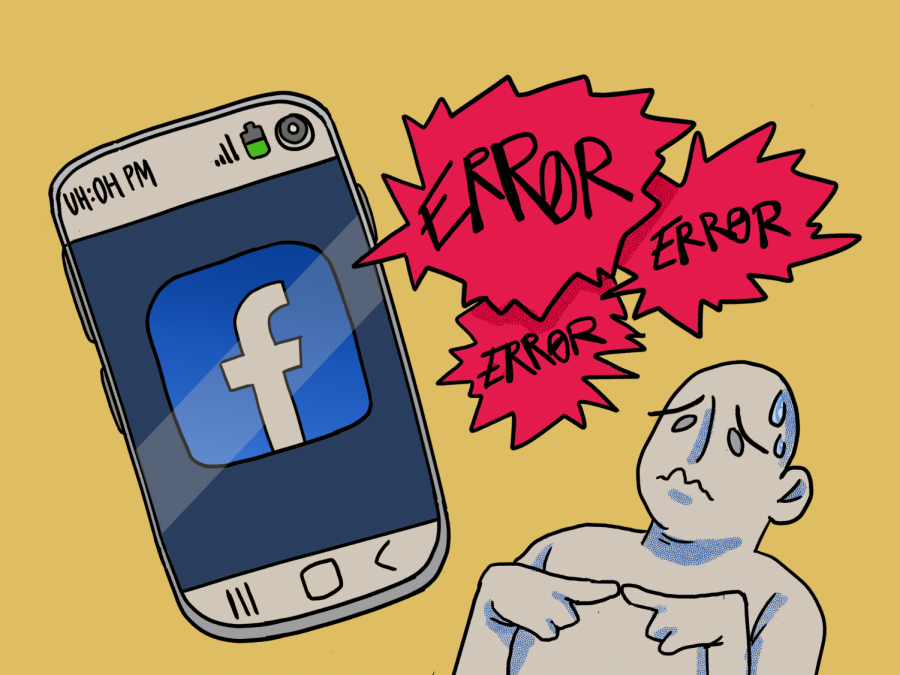Facebook’s outage reveals its dangerous power over everyone
October 15, 2021
The sweeping Facebook, Inc. outage, which left billions of users without access to the site as well as its various other properties, shined a spotlight on just how detrimental the tech giant’s business conduct is to a free-flowing democracy.
On Oct. 4, serial swipers across the globe saw their worst nightmare actualized. Facebook, Instagram and WhatsApp all remained down for nearly six hours.
In a blog post uploaded that night, Facebook attributed the outage to a configuration change in its routers. The following night, Facebook described the incident in greater detail, saying that the outage resulted from a maintenance error that severed the connection between Facebook’s data centers and the internet.
This was Facebook’s worst power outage since 2019 when the site was down for over 24 hours. This time around, the outage coincided with controversy surrounding the ethics of the company’s business practices.
Francis Haugen, a former Facebook product manager, handed over tens of thousands of internal documents she had amassed while working at the social network to The Wall Street Journal, which began publishing the findings last month.
The leak revealed many disturbing revelations about the company’s internal conduct, including that Facebook deliberately ignored misinformation and hate speech to boost ad revenue, as well as that company executives were aware that Instagram’s algorithm worsens body image issues among teenagers.
“I’ve seen a bunch of social networks and it was substantially worse at Facebook than what I had seen before,” Haugen said in an interview with “60 Minutes.” “Facebook, over and over again, has shown it chooses profit over safety.”
Haugen was set to testify about her experiences with the company only a day after everything went offline.
Facebook has consistently tapped into its impressive capital to absorb potential competitors. Instagram and WhatsApp, for example, were individual entities before Facebook bought them for $1 billion and $19 billion, respectively, as reported by BBC.
Thus, the internal affairs at a company that values profits over public safety indicate that its content moderation policies have a greater implication on the global discourse.
Rep. Alexandra Ocasio-Cortez used the outage to highlight the damage Facebook’s vast reach all over cyberspace has on the United States democracy and other nations.
“It’s almost as if Facebook’s monopolistic mission to either own, copy or destroy any competing platform has incredibly destructive effects on free society and democracy,” Ocasio-Cortez tweeted.
Ocasio-Cortez speaks to a greater issue of how Facebook’s conglomerative tendencies foster a poisonous interdependence between the company and its various offshoots, which dooms all if one fails to perform.
This is particularly dangerous in the current global climate, in which digital interconnectedness is essential to both communication and commerce.
The Latin American community is one such group that suffered greatly as a result of the recent outage.
Speaking to its woes was Forbes editor José Caparroso.
“Latin America lives on WhatsApp. I am surprised by so many people underestimating how catastrophic this downfall has been,” Caparroso tweeted.
The impossible tug-of-war between a widespread rebuking of Facebook’s practices in the form of a boycott and a global reliance on the social network for business and communication purposes means that the company likely won’t experience social consequences anytime soon.
Thus, the tech conglomerate needs to face legal repercussions.
Facebook is currently facing an antitrust lawsuit filed by the Federal Trade Commission. The company filed a motion to dismiss the suit on Oct. 4, claiming that there is no substantive evidence that the company has violated antitrust laws, according to Rolling Stone.
Facebook CEO Mark Zuckerberg has vowed to counteract any government attempt to stifle the company through antitrust actions.
The judge, who has until mid-November to respond to the corporation’s motion to dismiss the case, can make an example out of the conglomeration by moving to indict.
Tech giants such as Facebook must be held accountable for the extent of their influence. Although this outage was a rare occurrence, it revealed a pattern of power-hungry tendencies that have serious, catastrophic, global consequences.








